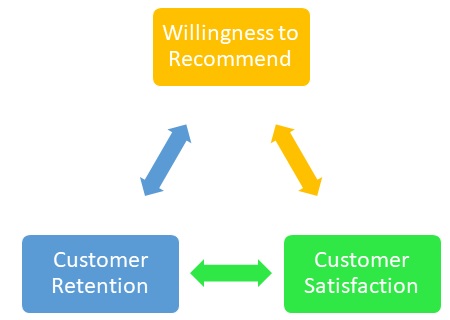- Business Concepts ›
- Marketing and Strategy ›
- Willingness to Recommend
Willingness to Recommend
Definition, Importance & Example
This article covers meaning & overview of Willingness to Recommend from marketing perspective.
What is meant by Willingness to Recommend?
Willingness to recommend is a metric which is an indicator of customer satisfaction. When a customer is happy with a product or a service, he/she may want to recommend the product or service to his/her friends or near and dear ones, relatives and colleagues. Willingness to recommend can act as a powerful marketing advantage in making the brand or product popular in a segment. Many marketing managers feel willingness to recommend is a metric that can make or break a brand or a product.
If a product renders itself very useful for a customer or leaves an imprint in the customer’s mind, we see that the customer remembers that product for a very long time and keeps recommending it as and when he is reminded of the product. He/she only says good things about the product from attributes to usage. This becomes the base of branding for a newly launched product.

Importance of Willingness to Recommend
The metric willingness to recommend gives an indication about various other marketing requisites like:
1. Brand recall: Willingness to recommend is a direct indicator of how much a customer recalls a brand after having experienced it or used any of its products.
2. Brand recognition: This metric gives a measure of how much a brand is reinstated in the customer’s mind.
3. Customer retention: This metric also tells us that if a customer is willing to recommend a brand/product, he/she is indeed loyal and will be retained for a long time.
4. Customer acquisition: This metric clearly tells us that customers willing to recommend the brand to other potential customers will generate newer customers and increase the already existing customer base.
5. Customer satisfaction: This metric indicates that if a customer is willing to recommend a brand, he/she is satisfied with the service or the product.
6. Purchase and re-purchase: This metric tell us how a customer who is willing to recommend the brand, will keep purchasing it in the future as well.
Read More
Advantages of Willingness to Recommend
1. Willingness to recommend can make or break a brand. This metric is a direct indicator of the customer satisfaction.
2. Willingness to recommend is primarily measured using the Net Promoter Score, thereby giving a qualitative and quantitative value in return.
3. It can be measured using questionnaires and by analysing Likert scale responses.
Disadvantages of Willingness to Recommend
1. Incorrectly measured might give a wrong indication, this metric may lead to marketers having the wrong impression about the brand.
2. If the metric indicates that a customer is not willing to recommend the brand, this might just be an indicator or failure.
Example of Willingness to Recommend
Let’s say a survey was done and a set of people were asked how much were they willing to recommend the new Nestle cereal, NesPlus. If they said that they are not willing to recommend this brand after using it, would indicate that something is wrong with the product. This product is a new entrant in the market, so willingness to recommend becomes a very essential metric in the analysis of how the product will do in the market.
Hence, this concludes the definition of Willingness to Recommend along with its overview.
This article has been researched & authored by the Business Concepts Team which comprises of MBA students, management professionals, and industry experts. It has been reviewed & published by the MBA Skool Team. The content on MBA Skool has been created for educational & academic purpose only.
Browse the definition and meaning of more similar terms. The Management Dictionary covers over 1800 business concepts from 5 categories.
Continue Reading:
What is MBA Skool?About Us
MBA Skool is a Knowledge Resource for Management Students, Aspirants & Professionals.
Business Courses
Quizzes & Skills
Quizzes test your expertise in business and Skill tests evaluate your management traits
Related Content
All Business Sections
Write for Us